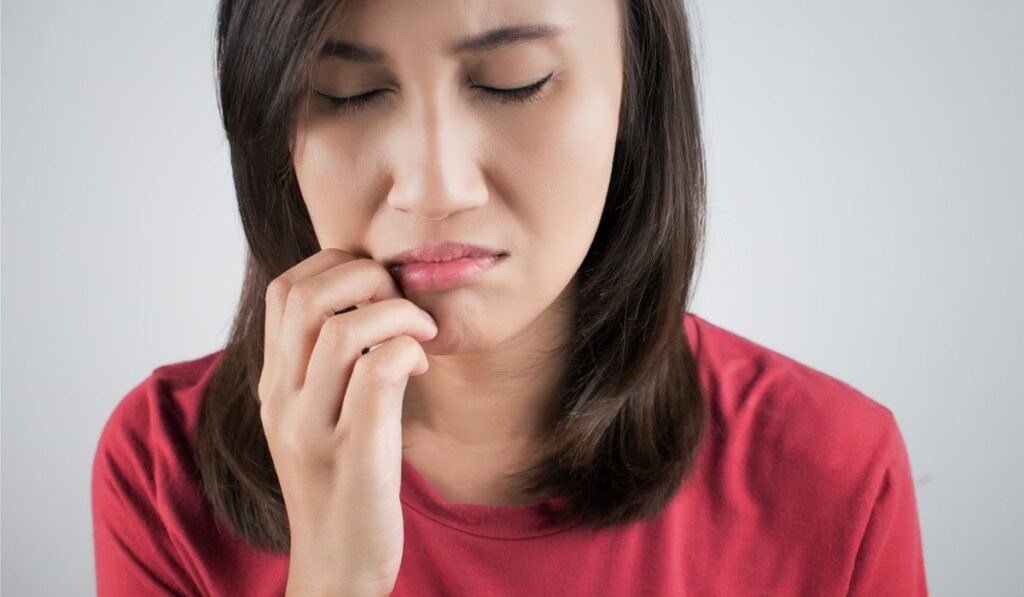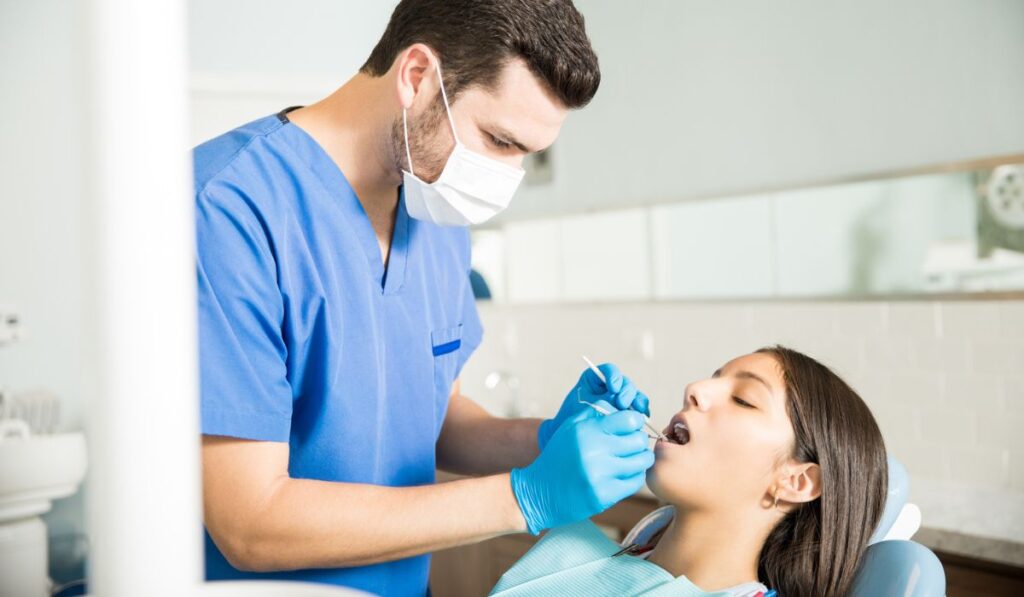Nothing’s more frustrating than feeling an itchiness on the roof of your mouth and not knowing how to make it stop. So, what causes this condition, and how can you address it?
The roof of your mouth may be itchy due to allergies, cold sores, oral thrush, a viral infection, or, in some rare cases, anxiety. Once you narrow down the reason for the itchiness on the roof of your mouth, you may be able to use a home remedy to treat it. Some cases require professional attention.
If you’re suffering from itchiness on the roof of your mouth, it’s important to figure out why it’s happening. Let’s look at some of the most common causes, what you can do to treat them, and whether you need to see a doctor.
What Causes Itchiness on the Roof of Your Mouth?

Familiarizing yourself with the various causes of itchiness on the roof of your mouth can help you to treat it as quickly as possible. Many of the causes can be treated at home, while others may require you to see a doctor to receive other treatment options.
Whatever the cause of the roof of your mouth itchiness, you should know that there’s relief if you can figure out what’s going on. Here are some of the primary causes to consider:
Allergies
If the roof of your mouth begins itching suddenly, you may be suffering from an allergic reaction to something. These reactions can be caused by either something you ate or something you came into contact with recently.
If you’ve eaten a food that you haven’t tried before, for instance, you may begin experiencing an allergic reaction. This means that the roof of your mouth or even your tongue can experience burning, itching, or tingling.
The same thing can happen if you happen to come into contact with something that you’re allergic to or are suffering from seasonal allergies. One of the symptoms of such allergies is itchiness to the roof of your mouth, along with a slew of other unpleasant symptoms.
Cold Sores
The herpes simplex virus typically causes cold sores to form on the outside of your mouth from time to time. These sores usually show up alone; however, they can also appear in a cluster.
Most people who suffer from the herpes simplex virus and get cold sores occasionally can feel them coming on before they can see them. This typically happens due to the tingling or itchiness on or around the outside of the mouth.
As cold sores are forming and when they make their appearance, you may experience itchiness not just on the outside of your mouth but inside as well. This is because the cold sore is caused by a virus that can wreak havoc on your immune system and cause various symptoms along the way.
Oral Thrush
Although oral thrush is more commonly found in babies, it’s still a possible cause of itchiness on the roof of your mouth. This condition is often symbolized by a white patchy residue that is found on the tongue and itchiness inside the mouth, including on the roof.
Other symptoms of oral thrush can be raw patches throughout the mouth that may make eating more difficult or undesirable. This condition can be very frustrating, and it may leave you feeling extremely irritable.
To combat this infection, you should rinse your mouth out after every meal. If you or someone you know has symptoms of thrush, it’s recommended to see a doctor or dentist as soon as possible for treatment.
Viral Infection
One common condition that can cause the roof of your mouth to be itchy is a viral infection that either affects only the mouth or the entire body. If you have a viral infection of the upper respiratory tract, it can often lead to itchiness inside the mouth.
If the itchiness on the roof of your mouth is accompanied by sneezing, coughing, sore throat, or any other upper respiratory symptom, you may have a viral infection. In most cases, the infection has to run its course before the itchiness will subside.
If you have a viral infection, it’s recommended that you stay hydrated and rest as much as possible. If your symptoms get worse, of course, you may want to see a doctor for further treatment.
Anaphylaxis
An anaphylactic reaction to something can include symptoms of tingling sensations, itchiness, and swelling inside the mouth or throat. It’s considered a medical emergency and requires the help of medical professionals immediately.
While not all allergic reactions are severe enough to lead to anaphylaxis, it can occur in certain people and certain situations. Symptoms of anaphylaxis include hives, tightness and swelling in the throat and mouth, nausea, abdominal pain, dizziness, and fainting.
Keep in mind that some people who are experiencing anaphylactic reactions are at risk of having a heart attack. You must seek immediate medical care if you suspect that you or someone else is experiencing this type of reaction.
Anxiety
In some rare cases, anxiety can also cause itchiness on the roof of your mouth. While the most common symptoms of anxiety are rapid heart rate, sweating, and increased respirations, others may experience itchiness around the lips and inside the mouth.
Keep in mind that anxiety affects people in very different ways and can even be different each time you have an attack.
If you’re experiencing anxiety, you should talk to your doctor to find out the best course of treatment. They can either prescribe medication or refer you to a counselor that can help you get control of your symptoms.
At-Home Remedies to Relieve an Itchy Mouth
It’s important to keep in mind that the remedy for an itchy mouth will depend on the specific cause. In most cases, however, there are similar treatments for the condition, and a visit to the doctor won’t be necessary.
If your itchy mouth is caused by allergies, for example, you should ensure that you’re taking either prescription or over-the-counter medications to relieve your symptoms. However, if your allergic reaction is more severe, you will need to seek the help of a medical professional.
If your itchy mouth is caused by cold sores brought on by the herpes simplex virus, unfortunately, there’s not much that can be done except to allow it to run its course. There are over-the-counter and prescription medications that you can apply to the cold sores to get some relief in the meantime, such as this gel from Campho-Phenique (on Amazon).
At-home remedies for other conditions include rinsing your mouth with warm salt water. Also make sure you’re brushing your teeth and rinsing your mouth after every meal to prevent more germs from growing in the area.
When to See a Doctor

There are some cases of itchiness at the roof of the mouth that can’t be cured through at-home remedies. In these cases, you’ll need to seek the help of either a doctor or medical professional for further advice.
For example, if you’re experiencing oral thrush, you must see your doctor or dentist as soon as possible for proper treatment. Doing this will prevent it from continuing and spreading even further.
If you think you’re having symptoms of an allergic reaction, you may want to seek the advice of your doctor. They may even refer you to an allergy doctor to get to the bottom of what’s causing your symptoms.
If you’re having an allergic reaction to something, it’s very important that you monitor your symptoms to ensure that you’re not experiencing anaphylaxis. If you begin to have trouble breathing, you should either call 911 or get to a hospital as soon as possible.
Final Thoughts
The bottom line when it comes to the roof of your mouth itching is that there’s almost always a cause. Whether the condition is mild or more severe, you should be aware of the various potential causes so that you can make an informed decision about how to get the proper treatment.


